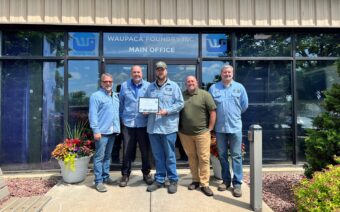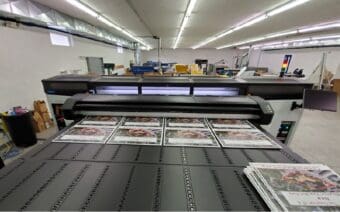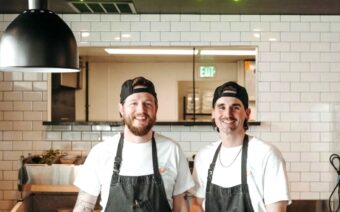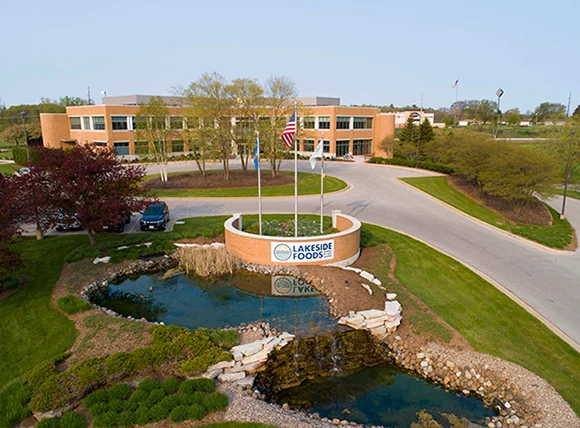
July 12, 2023
NORTHEAST WISCONSIN – Just as the name suggests, Lakeside Foods in Manitowoc has long been located on the shores of Lake Michigan.
What stands today represents decades of evolution – its humble beginnings dating back more than 140 years.
Developing a market
After years of farming in Pennsylvania, Albert Landreth moved west to Wisconsin, settling down on the shores of Lake Michigan in Manitowoc.
At the time – after starting to grow pea pods in the late 1870s – Landreth recognized the Midwest’s lack of a commercial canning company.
So, around 1883, Landreth began to experiment.
Lakeside Foods Communications Director Anne Smith said Landreth’s mother-in-law owned a hotel on the lakeshore, and he used her kitchen to develop a small commercial packing company.
Landreth sold a few hundred cans over two years under the Lakeside Foods brand – quickly recognizing there was a market.
In 1887, he built the first canning and packing plant in Wisconsin, and from there, Smith said the rest is history.
“Landreth started working with farmers, the same way we still do today, contracting with farmers to essentially lease their land for our vegetables,” she said.
By the 1920s, Smith said Lakeside had already begun to expand beyond peas – adding beets, corn, green beans, sauerkraut and potatoes.
When Landreth first started canning peas in the 1890s, Smith said the industry was brand new – and ran into some problems, like cans spoiling sooner than they should.
“He called a doctor of agriculture from the University of Wisconsin College of Agriculture, who inspected Landreth’s cans and identified the problem for him,” she said. “He found there were bacteria in the spoiled cans, and he helped Landreth refine the canning process.”
Smith said the partnership was short-lived, but the contribution to Lakeside’s success was undeniable.
“Albert Landreth died young, around age 41, and his son took over the company before eventually selling to a group of employees,” she said. “Lakeside began to grow through a series of acquisitions and mergers, and in 1982, we started freezing vegetables, as well as canning them.”
Smith said Lakeside Foods is a private label manufacturer, which means if you go to a store, you won’t find a Lakeside Foods label.
“Instead, in Walmart, you’ll find Great Value, in Piggly Wiggly, you’ll find Food Club and in Meijer, you’ll find the Meijer brand,” she said.
Today, Lakeside Foods boasts a total of 14 production facilities, with locations in Wisconsin and Minnesota.
New headquarters
The first Lakeside Foods’ plant was built in Manitowoc in 1887.
“That plant is still in use today,” Smith said. “Our offices were located in that building until 2000 when we ran out of room, and at that time, we bought the Manitowoc public library as the city was selling it.”
The city built a new library near Lakeside’s oldest plant, and the former library served as Lakeside’s offices for 23 years, until, Smith said, the company outgrew that, too.
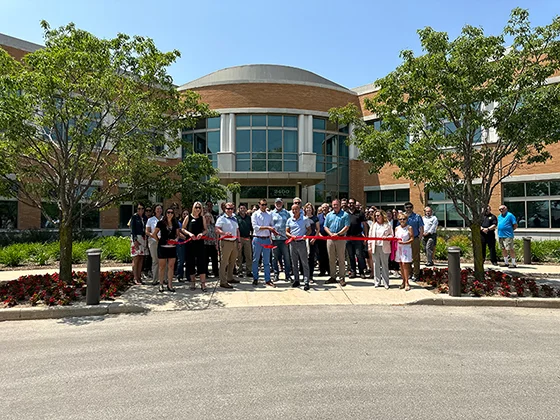
Lakeside Foods held an official ribbon cutting of its new headquarters earlier this month. Submitted Photo
“In 2000, we began to expand to products beyond vegetables,” she said. “We started a joint venture with another company and started producing frozen whipped topping under a store label brand in Ohio.”
Then, in 2015, Smith said the company started another joint venture producing pet food at one of its former vegetable canning plants in Eden, Wisconsin.
“In 2018, we bought Riverside Foods, which makes appetizer-style food like breaded frozen cheese curds, onion rings and jalapeno poppers – all the stuff that gets sold at bars or fairs,” she said.
Smith said Lakeside also bought Serious Bean Co. in 2018.
“Our last, most recent acquisition is Cher-Make Sausage, which started in Manitowoc in 1928, and produces sausage, hot dogs, bologna, bratwursts and more,” she said.
Smith said the Lakeside Foods team also has grown significantly over the past 20 years – adding supply chain staff, sales members, office staff and food safety teams for each new product.
“We have a corporate food safety team and a vice president of food safety and quality, and she oversees the work of all the individual teams,” she said. “There is a food safety team that works exclusively with Riverside products, a team for Cher-Make Sausage, a team for whipped topping and even a team for pet food because food safety matters to us at every level.”
With all these new employees, Smith said Lakeside was quickly running out of room.
“In 2022, we did a full-scale review of whether we should expand our current building or look to purchase a new building,” she said. “The group consensus was to find a new building. We found a building that offered a lot of great benefits – it was much newer than our previous office, 20% bigger and it had the opportunity to create a lot of open and collaborative spaces.”
It’s also right off Highway 41, which Smith said “provides some great visibility for us.”
Despite all the pros, Smith said the building still needed some adjustments to fit the needs of Lakeside Foods.
“We took ownership in August 2022, and we did a six-month renovation,” she said. “We put in new paint, new carpeting and new floors. We also built a culinary research and development lab, because we’re doing a lot of innovating on new products and testing for quality assurance.”
Collaborative spaces are playing a larger and larger role in business, Smith said.
“We’re employing the next generation of workers right now – we have a group of five to nine interns this summer, and they were stuck in cubicles in our old office,” she said. “At the new location, every time I walk past one of our collaborative spaces, I see at least two or three interns working in there.”
The new space, Smith said, also allows for more technology to the company’s conference rooms.
“We’re equipping all our new conference rooms to be enabled for Microsoft Teams because we have workers both on-site and remote, we have workers calling in from our other locations in Wisconsin and Minnesota, and as we hire new employees, we’re offering more flexibility,” she said. “It’s not about where you work, it’s about getting the work done and doing a good job. We have employees in Kansas, Colorado and even Cincinnati, Ohio – so even though we’ve always had some remote workers, we’re looking to expand on that.”
Lakeside Foods employs 1,000 workers full-time and hires an additional 1,000 for seasonal work over the summer.
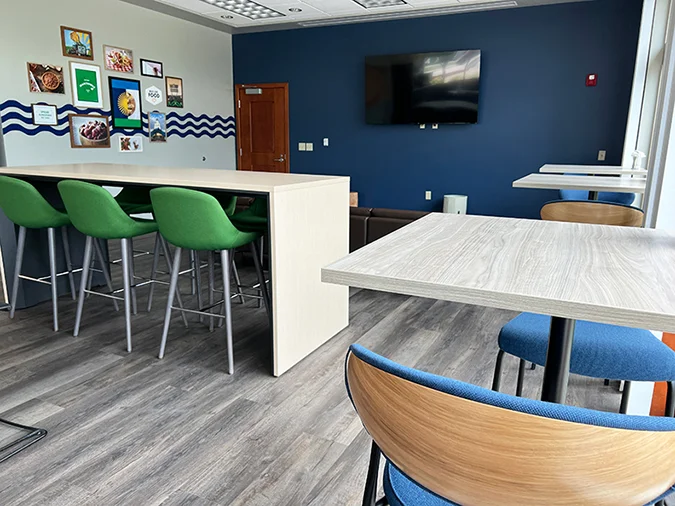
The new facility includes a handful of collaborative working spaces. Submitted Photo
“We’re always looking for employees that want to be part of a team, that want to work hard,” Smith said. “We’re a family-owned, privately held company and that’s getting rarer. When you think about large companies out on the west or the east coast, we provide more of a family feel, as a smaller company.”
Giving back
Smith said Lakeside has done what it can to give back to the communities they work and live through government feeding programs.
“In the 1970s, we began working with the USDA to can beef for their feeding programs, for food pantries, hospitals, schools and prisons,” she said. “It must be good because I can’t tell you how many inquiries a week we get through Facebook asking where people can buy this canned meat, but unfortunately, it’s not for sale commercially.”
Besides government feeding programs, Lakeside also donates food to Feeding America in eastern Wisconsin.
 How powerful is paper in NE Wisconsin?
How powerful is paper in NE Wisconsin? Savor a piece of history at The Pearl Ice Cream Parlor & Confectionery
Savor a piece of history at The Pearl Ice Cream Parlor & Confectionery


